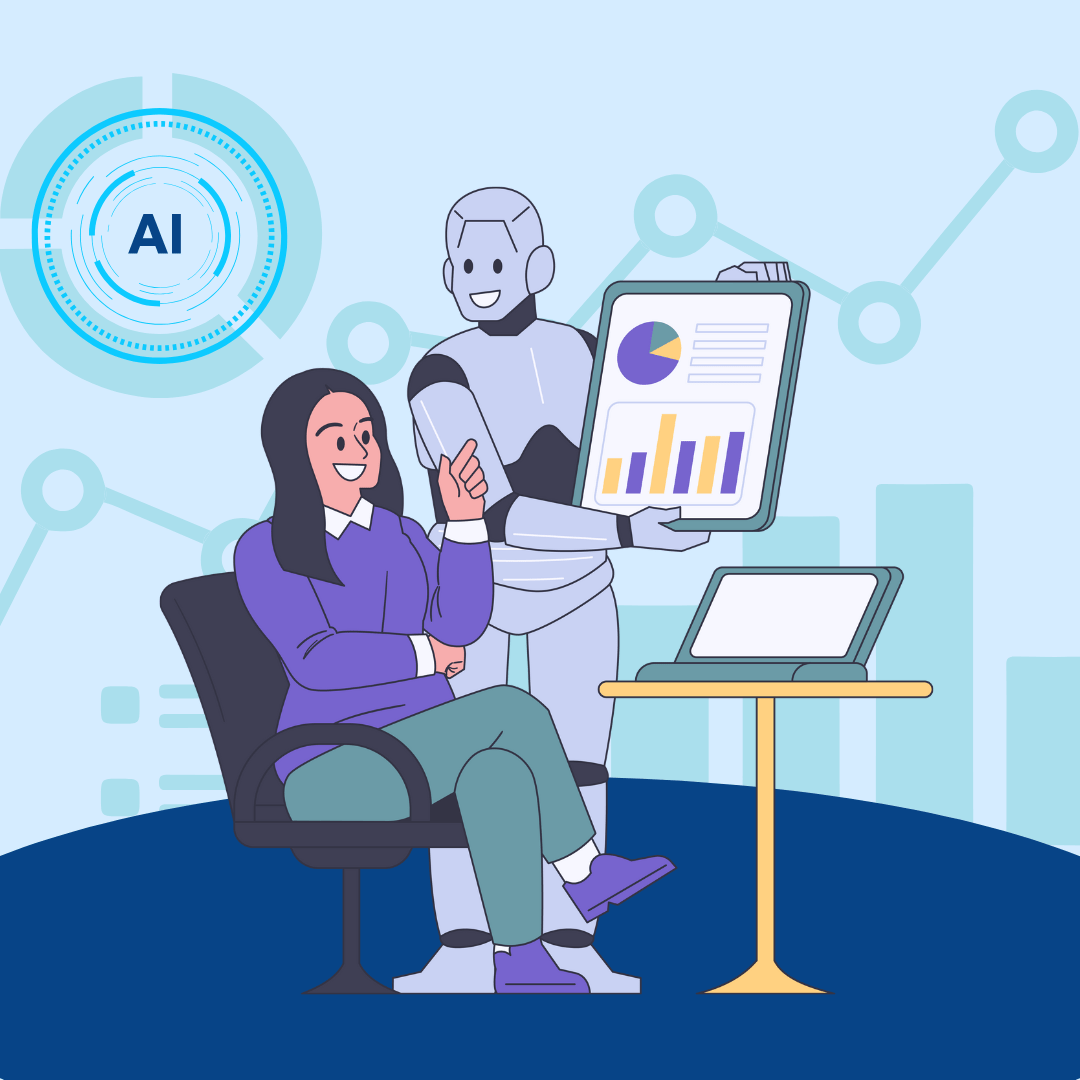
Artificial intelligence (AI) is transforming industries across the board, and market research is no exception. AI-powered tools are bringing unprecedented efficiency, deeper insights, and refined accuracy to market research. However, as with any technological innovation, adopting AI in this field presents unique challenges alongside its numerous opportunities. This article delves into how AI is shaping market research, the advantages it offers, and the obstacles businesses must navigate.
What is AI in Market Research?
Artificial Intelligence (AI) in market research refers to the use of machine learning, natural language processing, and predictive analytics to analyze consumer data, identify trends, and gain actionable insights. With AI, market research can be more data-driven, faster, and more precise, leading to better strategic decision-making.
How AI is Transforming Market Research
The implementation of AI is revolutionizing traditional methods in market research, from automating data collection to enhancing predictive analytics. Here are the key areas where AI is making a substantial impact:
- Automated Data Collection: AI speeds up the data-gathering process, pulling information from multiple sources like social media, surveys, and transaction records.
- Sentiment Analysis: Natural Language Processing (NLP) enables AI to interpret consumer sentiment, gauging public opinion on products or brands.
- Predictive Analytics: AI’s data-processing power supports predictive models that anticipate consumer behavior.
- Real-Time Insights: AI tools provide real-time insights, allowing companies to react swiftly to changes in consumer preferences and market conditions.
Opportunities of AI in Market Research
AI in market research offers numerous opportunities that enable businesses to gain deeper and more nuanced insights.
1. Enhanced Data Analysis
AI can analyze large datasets quickly, uncovering trends and patterns that would take humans much longer to detect. This ability to swiftly process large quantities of data enables companies to make data-driven decisions more effectively.
2. Improved Customer Insights
AI enables researchers to dive deeper into customer preferences, behaviors, and motivations. By analyzing historical and current data, AI-powered tools can segment customers more accurately, identifying high-value prospects and tailoring marketing efforts accordingly.
3. Predictive Analytics for Strategic Forecasting
AI’s predictive analytics helps companies forecast future trends based on historical data. This capability allows businesses to anticipate customer needs and adjust marketing strategies proactively. With accurate forecasting, companies can improve product development, demand planning, and inventory management.
4. Real-Time Sentiment Analysis
Sentiment analysis using NLP allows companies to understand public perception in real-time, providing instant feedback on campaigns, products, and services. For example, monitoring social media sentiment around a new product launch can help brands respond quickly to customer concerns or capitalize on positive feedback.
5. Automated Survey Analysis
AI can automate survey results by analyzing patterns and providing summaries. This process not only speeds up data collection but also allows researchers to handle vast datasets with minimal manual effort, leading to faster and more cost-effective survey analysis.
6. Efficient Market Segmentation
AI-driven tools enable more detailed market segmentation, allowing businesses to tailor products, messages, and strategies to specific customer demographics. This ability to break down large consumer groups into detailed segments enhances the precision and impact of targeted marketing efforts.
7. Cost Savings and Efficiency
By automating repetitive tasks and reducing human error, AI helps companies cut down on operational costs associated with market research. This efficiency allows researchers to focus on interpreting results and crafting strategies rather than spending time on data collection and processing.
Challenges of AI in Market Research
While AI brings undeniable benefits to market research, companies face several challenges in its implementation.
1. Data Privacy and Security Concerns
The vast amount of data collected and processed by AI-powered tools raises privacy and security issues. Compliance with data protection regulations, like GDPR in Europe, is essential to avoid legal repercussions and maintain customer trust.
2. Reliance on Quality Data
AI’s accuracy and effectiveness are highly dependent on the quality of the data it processes. Poor-quality, outdated, or biased data can lead to inaccurate insights and flawed predictions, resulting in ineffective decision-making. Ensuring clean, representative, and current data remains a critical challenge.
3. Lack of Transparency in AI Algorithms
AI models, particularly deep learning models, are often considered “black boxes” due to their complex inner workings. For businesses, this lack of transparency can be problematic, as it’s difficult to interpret how an AI system reaches certain conclusions. Trusting AI-driven insights can be challenging when the underlying processes are not fully understood.
4. Skill Gap and Training Requirements
Market research teams may lack expertise in AI, machine learning, and data science. Bridging this skill gap requires investment in training or hiring specialized personnel, which can be a significant cost for companies, particularly small to medium-sized enterprises.
5. Integration with Traditional Methods
Integrating AI with traditional market research methods can be complex. While AI provides quantitative data-driven insights, traditional methods like focus groups and interviews provide qualitative insights. Balancing both approaches to obtain a comprehensive market view can be challenging.
6. Cost of Implementation
Although AI can lead to long-term cost savings, the initial investment in AI technology, including software, hardware, and training, can be significant. Companies must weigh the costs against the potential benefits to determine if AI is a viable solution for their market research needs.
7. Risk of Over-Reliance on AI
Relying too heavily on AI-driven insights may lead to overlooking qualitative insights that can only be gathered through human interactions, such as focus groups or customer interviews. Striking the right balance between AI and human analysis is essential for a well-rounded approach.
Applications of AI in Market Research
- Social Media Monitoring: Analyzing customer sentiment and trends through social platforms.
- Chatbots and Virtual Assistants: Gathering customer feedback and delivering surveys in a conversational manner.
- Consumer Segmentation: Identifying key demographics and segmenting markets with increased accuracy.
- Product Development: Analyzing customer feedback and market demand to inform product innovation.
- Ad Testing: Real-time analysis of customer reactions to advertisements to improve ad performance.
Ethical Considerations in AI-Driven Market Research
Ethical considerations are paramount when using AI for market research. Companies must navigate privacy concerns and potential biases in AI algorithms to maintain public trust and uphold ethical standards.
1. Avoiding Bias in AI Models
AI models can inherit biases from the datasets they’re trained on, leading to skewed or unfair results. Ensuring AI models are trained on diverse and representative data is essential to avoid perpetuating stereotypes or inaccuracies.
2. Transparent Data Practices
Companies must be transparent about how they collect, store, and use customer data. Following ethical guidelines and obtaining proper consent from users helps build trust and aligns with data protection regulations.
3. Balancing AI with Human Oversight
Human oversight in AI-driven market research ensures that automated processes don’t miss contextually relevant insights. Integrating human expertise with AI results allows for more balanced and ethical decision-making.
Future of AI in Market Research
The future of AI in market research holds exciting potential. As AI technology advances, it is expected to become more integrated into real-time decision-making, enabling marketers to tailor strategies instantly based on data-driven insights. AI-driven tools could also lead to hyper-personalized marketing efforts, leveraging data to anticipate individual consumer needs even more precisely.
Emerging Trends
- AI-Powered Predictive Marketing: Leveraging predictive analytics to create targeted marketing strategies.
- Voice Recognition Technology: Analyzing consumer opinions and sentiment via voice interactions.
- Augmented Reality (AR) and Virtual Reality (VR): Collecting insights on consumer preferences through simulated experiences.
- Ethics-Driven AI Development: Greater focus on ethical AI that aligns with societal values and regulations.
Conclusion
AI is reshaping the landscape of market research, offering remarkable opportunities for data-driven insights and customer understanding. However, it also presents challenges, from data privacy concerns to the need for quality data and ethical considerations.
Q1: What types of data does AI in market research analyze?
AI can analyze structured data (like survey responses) and unstructured data (like social media posts or video content), providing a comprehensive view of market trends.
Q2: Can AI fully replace traditional market research?
AI enhances traditional methods but doesn’t fully replace qualitative research. Combining AI with human expertise is ideal for a balanced approach.
Q3: How does AI ensure data accuracy in market research?
AI relies on high-quality data and robust algorithms to produce accurate results. However, maintaining data accuracy involves consistent monitoring and quality checks.
Q4: How is customer sentiment analysis performed using AI?
Sentiment analysis uses natural language processing (NLP) to evaluate consumer sentiment based on text data from reviews, comments, or social media interactions.
Q5: What is the cost implication of using AI in market research?
The cost varies depending on the tools and infrastructure required. While initial investment may be high, AI can lead to long-term savings by improving efficiency and accuracy.
Explore More:


